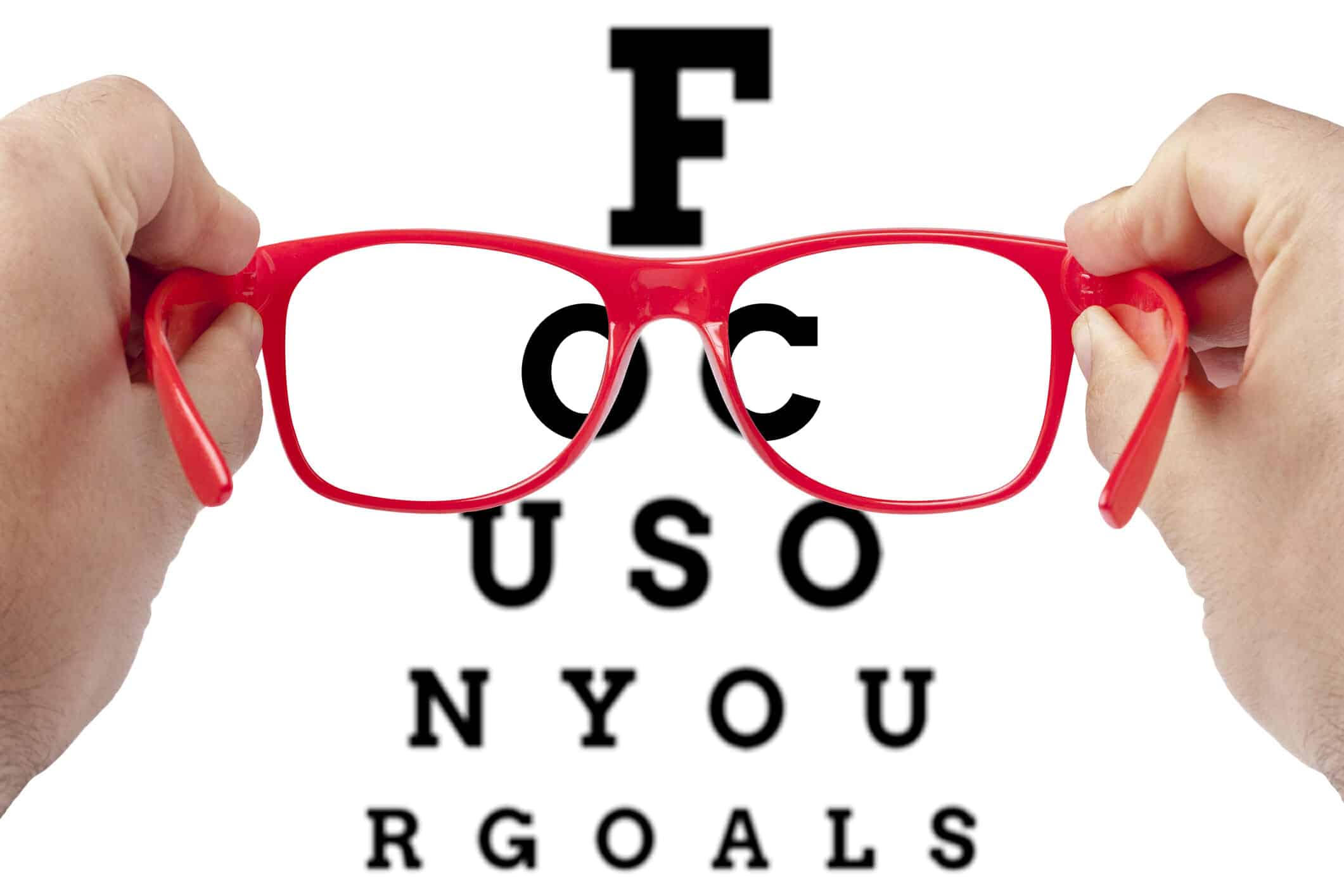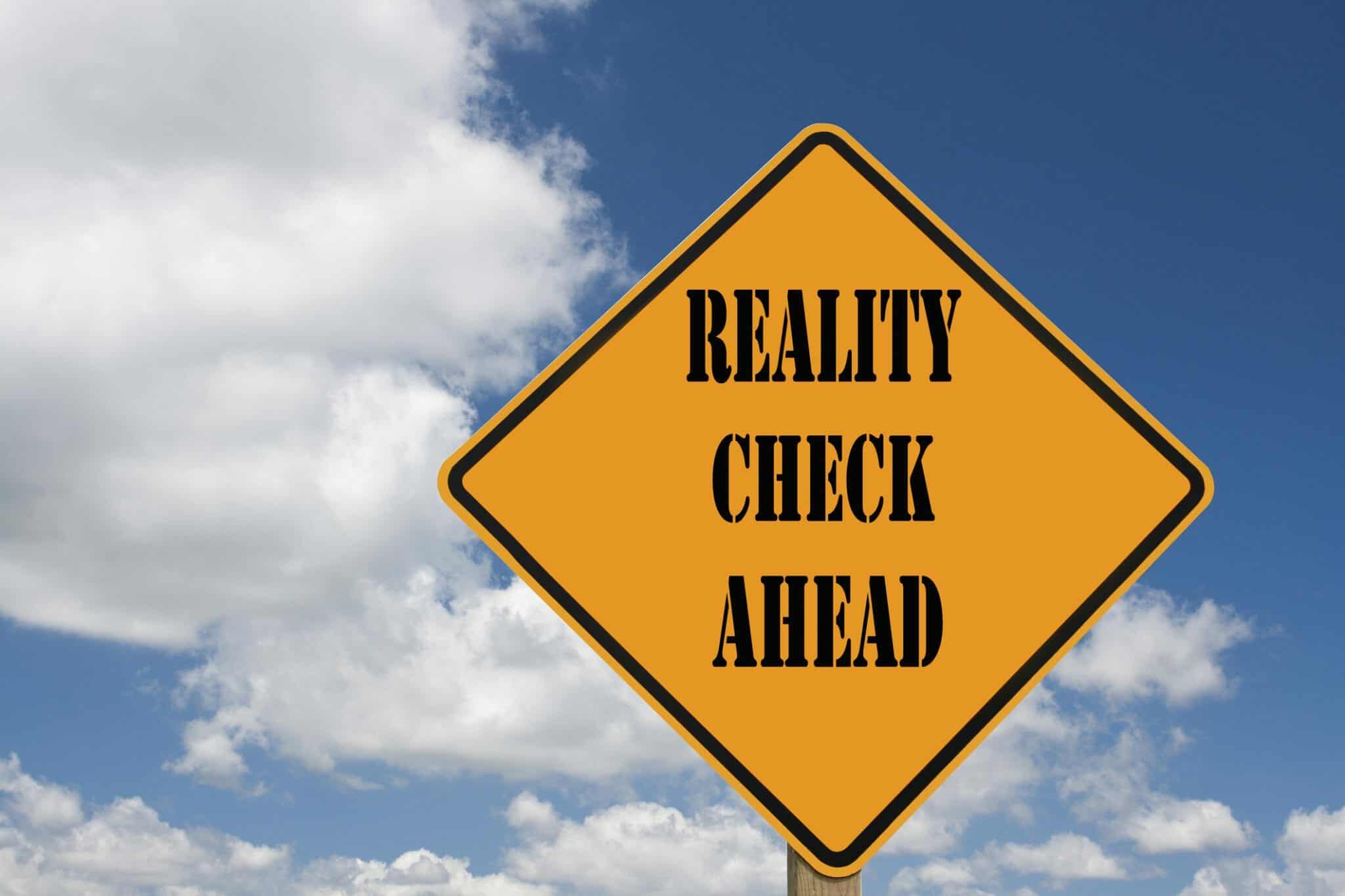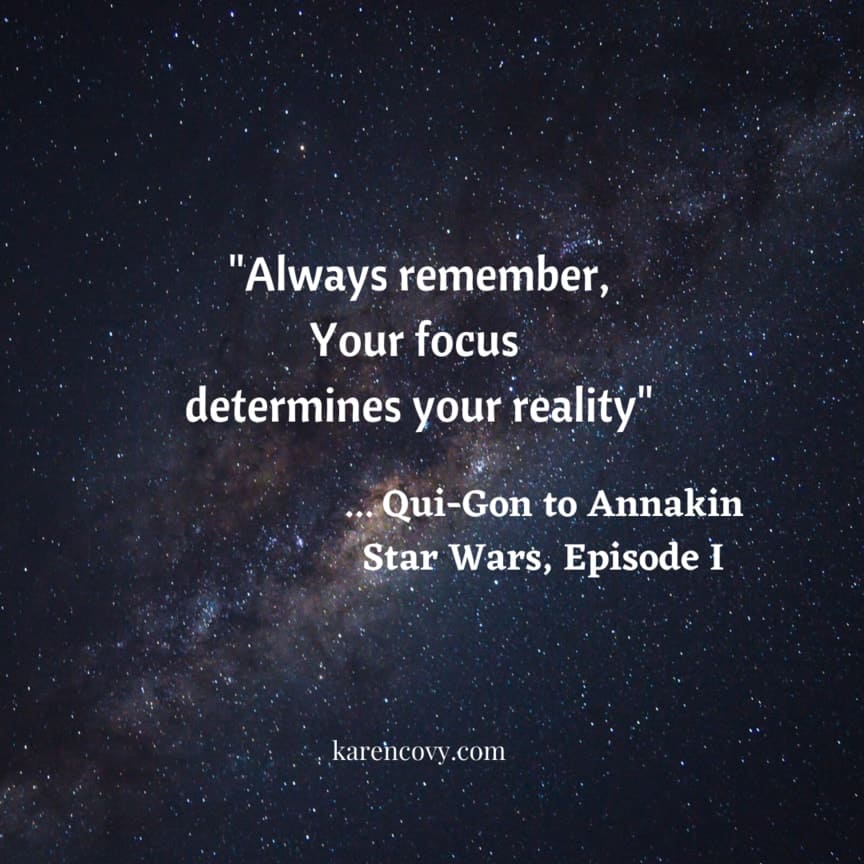We've all heard about the power of focus. But what does that really mean? Consider this story.
The teacher stood at the front of the classroom.
Today we’re going to take a quiz, she told the class.
She passed out papers, instructing the students to keep them face down on their desks, just like always. Once everyone had their paper, the teacher signaled the students to turn them
over and begin.
Within seconds, thirty confused faces peered up at her. On every desk was a white sheet of paper with a black dot in the middle of it.
Please describe what you see on the paper.
Confused, the students started writing.
Twenty minutes later, the teacher collected the quizzes and read what was written out loud.
I’m not going to grade these papers, she said. But I do want to make you think.
This quiz is a black dot on a piece of white paper. Every single one of you described that black dot for me.
Some of you told me about how big it was. Others described where it was on the page. Still others made up stories about the black dot.
ALL of you talked about the black dot.
But NO ONE mentioned the white page.
You all focused on the black dot. It was as if the white page, which was much bigger than the black dot, didn’t even exist.
Life is like this page. It’s full of beauty and wonder. But we don’t see it because we’re focused on everything that’s wrong with our life. We’re focused on our illnesses and
ailments, our worries, and fears.
We’re so focused on the black dot of what we DON’T want, that we completely miss the white space that is filled with what we DO want.
So, What Does a Black Dot Have to Do With Divorce?
The moral of the story of the little black dot seems obvious enough. Focus on the good things in life instead of the bad. Be grateful for what you have, rather than being miserable
because of what you lack.
How does this story could apply to divorce?
The easy answer is to say that divorce is like the little black dot. When you’re going through it, divorce is all you can focus on. It overtakes your world. All you see is black.
But, if you look beyond the blackness, you will see the white space. That white space is everything else in your life that you have to be grateful for.

While that’s certainly the obvious analogy, there’s more to the story.
The real moral of the story isn’t simply about looking for the good in life. It’s not just about gratitude. (Although, both of those are valid and important interpretations of the story.)
What the story is really about is the power of focus ... and the fact that you have the power to choose what you focus on.
The Power of Focus

What you focus on expands.
Focus on the black dot, and all you see is the darkness.
Focus on the white space, and all you see is the light.
At the same time, it pays to remember that the page has BOTH a black dot and white space.
So the most important question to answer is not: Which is better, the black dot or the white space? Neither one is inherently better or worse than the other.
The real question is: Which one will you focus on? Or, perhaps more importantly, What do you want to achieve by focusing on one versus the other?
When you’re facing divorce, then, the most important question you can ask yourself is not: How do I get through this ordeal and survive? Rather, the most important questions are: What will I focus on? and What do I want?
Unfortunately, those are questions that most people who are going through a divorce never bother to ask.
What Are You Focusing On?
Divorce triggers your most primal survival instincts in a way that most other life events (short of going to war) don’t.
Suddenly you are worried that you won’t have enough money to live on. You’re worried that you’ll lose your house or your kids. You’re worried that you’ll be alone for the rest of your life.
All that worry, all that fear, focuses your attention on everything you DON’T want.

That’s normal.
Our brains have evolved over millennia to keep us out of danger. So, we’re hard-wired to look for what’s wrong in any situation. When a situation (like divorce) is full of things that could go wrong, our brain lights up like a pinball machine in a busy arcade.
We see danger everywhere. So, we focus on THAT. We focus solely on our fears. We get locked in survival mode.
The problem is that, when you’re in survival mode, you don’t have the time, the insight, or the energy to look beyond your immediate circumstances and see the bigger picture. You’re so busy focusing on the drama in your life TODAY that you forget to consider what kind of life you’re creating for yourself TOMORROW based upon the decisions you’re making right now.
That’s why most people never ask the one question that they SHOULD ask themselves in their divorce: What do I want?
Why Knowing What You Want Matters
The reason why knowing what you want is so important is simple.
If you don’t know what you want, how can you ever expect to get it?
Sure, you may be one of those lucky people who stumbles blindly through their divorce and still ends up okay in the end. But going through your divorce that way is like playing Russian Roulette with a fully loaded gun.
You’ve got a much greater chance of ending up where you want to be once your divorce is over if you start your divorce by figuring out what matters the most to you, and deciding where you want to be once it’s over.
As Stephen Covey so famously said, “You must begin with the end in mind.”
In other words, you need to focus on what matters.

How to Focus on What Matters in Divorce (… and in Life!)
Focusing on what matters sounds simple enough. Yet, as with so many other things in life, what seems simple can often be deceptively difficult.
Focusing on what matters, especially when your emotions are raging out of control and your future is uncertain, is much easier said than done. When your marriage is falling apart and your whole life is up in the air, it can be tough to focus on what day it is, let alone on what matters in your divorce!
Here are a few steps that will help you keep your eye on what’s important and let everything else go.

1. Figure out what you want.
Sounds so simple, right?
It’s not.
Most people know all too well what they DON’T want. But they never bother to figure out what they DO want.
There’s a difference.
I may know that I don't want to die of cancer. But that doesn't mean I want to die of anything else right now either!
Knowing what you DO want gives you the ability to create it. Knowing what you DON'T want only tells you what to avoid.
So take some time to honestly answer the question: What do I want?
When it comes to your divorce, maybe you want to stay out of court. Maybe you want to make sure the kids have a stable life after your divorce. Or maybe you want to make sure you have some level of financial security once you’re on your own.
Maybe it’s important for you to get your divorce done as soon as possible so that you can move on with your life. Or maybe you don’t want to spend a lot of money getting divorced.
Whatever it is that you want, write it down. Make a list.
2. Figure out what you need.
Figuring out what you want is important. But figuring out what you need is essential.
If you don't get the house in your divorce you can find another place to live. If you don't get the money you need to pay for your house (or anything else for that matter!) then you've got a much bigger problem.
To discover what you need, start by reviewing the list of things you want. Put a star by those that are needs.
If you find that you’ve got seventy-five things that you’ve starred as “needs,” it’s time to be a bit more selective.
Take a moment to consider whether you really NEED everything that you’ve listed as a need.
[HINT: Real “needs” normally involve your physical survival (i.e. things like food and shelter) and your psychological well-being (i.e. the need to feel safe, secure, connected to other people etc.]
Review your list of needs and then take a moment to consider whether you’ve left any important needs off your list.
Ask yourself: What do I need to survive after my divorce? Will I need to find a new place to live? Do I need to get a job (or a better job)? How much money do I need to be financially stable?
Again, make a list. You don’t have to put anything in order yet. Just make sure you get all of your needs down on paper.
3. Figure out what your kids need.
Besides figuring out what you need, you also need to figure out what your kids need. So, you’re going to make another list.
Again, resist the temptation to list things that are more “wants” than “needs.” Try to list only what your kids truly need for their physical, psychological, and developmental well-being.
Also, do your best to separate your desires from their needs. (Yes. There's a difference!)

For example, if you have been your kids’ primary caretaker, you may believe that your kids need to spend as much time with you as possible. In fact, that may be true.
But unless your spouse is physically abusive, it’s also true that your kids need to have a relationship with your spouse too. That means that they also need to spend time with your spouse.
Finally, when making your list of kids’ needs, flexibility is key. Your children’s needs will change as they grow and change. So, even though you’re making your list today, remember that your list will likely change in the future, especially if your children are very young right now.
[NOTE: You don’t necessarily have to list everything your kids will need from now until they’re grown and gone. Not only would doing that be exhausting, but it’s also unrealistic. Just list what they need to be happy and healthy for at least the next few years. You can re-evaluate your list again when things change.]
4. Prioritize your list.
After you’ve made your lists, combine them. That will give you an opportunity to see how your needs, and your kids’ needs, fit together (or don’t!).
Next, to make your list useful, you need to carefully choose what’s on the top of your list. You need to prioritize your list.
Start by numbering your items in order of most to least important. Make sure that your real NEEDS top your list. The things you want should generally be further down your list than the things you need.
After you’ve done that, you may want to pause for a moment and review your list. Make sure it accurately reflects what you want and need. (Mind you, there is no “right” or “wrong” way to do this list. It’s YOUR list! Put it together in the way that works best for you.)
It also helps to acknowledge that you’re not going to get everything on your list. You may not even get everything on your list that you need. What you will get from doing this exercise is a clear picture of what your priorities really are right now.
Of course, prioritizing your list means you’re going to have to make some tough decisions. For example, you may have to decide whether having a lot of time with your kids is more or less important than making enough money to pay your bills so that you and your kids can maintain your current lifestyle.
Yes, making these tough decisions sucks! At the same time, it’s enormously helpful.
The truth is that your situation is what it is. Prioritizing your list of wants and needs won’t change your situation. But it WILL make you aware of where your problem areas lie. It will clearly show you what you need to work on if you want to get BOTH what you NEED and what you WANT in the future.
[HINT: Yes. It’s totally possible to have it all. But it will probably take some time. You’re not likely to get everything you want and need in life within 30 seconds of getting a divorce.]
5. Do a Reality Check.
After you’ve made your prioritized list of wants and needs, it’s time to get real. It’s time to figure out what things on your list that you can realistically expect to get in your divorce. And it may be time to let go of those things that you're realistically never going to get in your divorce.
Doing this kind of a reality check starts by talking to your divorce lawyer. Find out what it’s legally possible for you to get in your divorce. Then ask your lawyer for what it’s PROBABLE that you will get in your divorce.

Insist on getting your lawyer’s HONEST opinion. While thinking that you’re going to get everything you need and most of what you want will make you feel good in the moment, you will feel infinitely worse at the end of your divorce if you fall way short of getting your needs met and you didn’t have time to plan for that.
Also, remember that your lawyer’s opinion is only an opinion. You may end up with more or less than what your lawyer thought. What you’re looking for at this point is a ball-park idea of what might happen, so that you can plan ahead.
Next, talk to your financial planner or your divorce financial adviser. Get a realistic picture of what your finances will look like after your divorce.
If you haven’t already done so, make a post-divorce budget. Doing that will help you see whether you’re likely to fall short each month. Your financial adviser will also be able to run projections for you about whether your retirement and kids’ college accounts are up to par or not.
Once you know what is legally and financially possible and probable in your divorce, you will be prepared to make better financial decisions in your divorce. You will KNOW which property settlements will work for you, and which will leave you in dire financial straights two years after your divorce.
For example, before doing this exercise, you may have wanted to keep your house for your kids. That may have seemed perfectly reasonable while you were in the middle of your divorce and your spouse was still helping to pay the bills.
But, once you realize that you won’t be able to make the mortgage payment on your post-divorce income, then keeping the house may be much less appealing.
As hard as it may be to face that reality, facing it now will give you more options for creating a more stable future.
6. Focus on Your Top Priorities.
Once you’ve made your list of priorities, it’s time to focus on those priorities in everything you do. That means that you keep your priorities in mind with every single divorce decision you make.
For example, if your spouse just did something stupid and you’re trying to decide whether to take him/her to court over it, ask yourself: “Does going to court right now get me closer to getting what I want and need, or farther away?”
Start evaluating everything you do in your divorce NOT by how you feel in the moment, but by asking whether doing that thing will make it more or less likely that you’ll get you what you want in the end.

[NOTE: This may not seem like a big deal. But it’s a game-changer. It keeps you from doing things that make you feel like you’re “winning” in the moment, but make you lose in the end!]

7. Keep Your Eye on Your Goal.
When your emotions are running high and your divorce is frustrating the devil out of you, it’s easy to get sucked into arguing about every little thing. Most people going through a divorce find themselves arguing about things they don’t even care about!
Resist that temptation!
Use the power of focus to concentrate on what truly matters to you. Dial-in on those few things that will make the most difference to you in the end, once your divorce is over and you’re trying to build a new life.
Fight for what truly matters.
Let go of what doesn’t.
Doing that isn't easy. It takes a lot of discipline and self-control – especially at first. Yet it can make an enormous difference in where you end up once the judge has banged the gavel and your divorce is behind you.
So, when you’re faced with a decision in your divorce, take a deep breath and remember your list of priorities. Focus on what matters.
If you find yourself arguing with your spouse about anything that’s not on your list – let it go. It’s not important.
Using the Black Dot in Your Divorce
You have the power to choose what you focus on.
When you’re going through a divorce you can focus on all the drama and ugliness. Or you can focus on your priorities and on ending up where you want to be.
Both of those are choices. But, unlike the students who took the little black dot quiz, you now KNOW what your choices are. You know you have a choice.
The only question you need to answer, then, is: What will you focus on?
__________

This post was first published on May 20, 2020 and updated on August 13, 2024..

